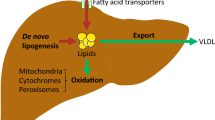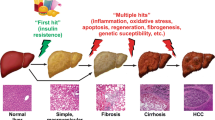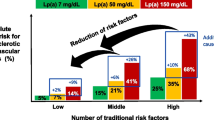Abstract
Although hypertriglyceridemia has repeatedly been implicated as an atherogenic condition, there are conflicting reports concerning the atherogenicity of products released from triglyceride-rich lipoproteins by lipoprotein lipase. The hydrolysis of triglyceride is a normal process by which chylomicrons and very low-density lipoproteins are metabolized and cleared from the circulation, which would suggest a beneficial role for lipoprotein lipase in reducing circulating levels of triglyceride and, therefore, reducing atherosclerotic burden. However, many in vitro studies have shown that lipolysis products such as fatty acids induce vascular cell inflammation, which can initiate or exacerbate atherosclerosis. This review summarizes the results and implications of recent studies on the effects of lipoprotein lipase on vascular inflammation, expanding upon existing controversy among human postprandial studies, animal models, and in vitro experimental models.
Similar content being viewed by others
References and Recommended Reading
Breslow JL: Cardiovascular disease burden increases, NIH funding decreases. Nat Med 1997, 3:600–601.
Hansson GK: Inflammation, atherosclerosis, and coronary artery disease. N Engl J Med 2005, 352:1685–1695.
Osterud B, Bjorklid E: Role of monocytes in atherogenesis. Physiol Rev 2003, 83:1069–1112.
Goldberg IJ, Merkel M: Lipoprotein lipase: physiology, biochemistry, and molecular biology. Front Biosci 2001, 6:D388–405.
Higgins JM, Fielding CJ: Lipoprotein lipase. Mechanism of formation of triglyceride-rich remnant particles from very low density lipoproteins and chylomicrons. Biochemistry 1975, 14:2288–2293.
Fan J, Unoki H, Kojima N, et al.: Overexpression of lipoprotein lipase in transgenic rabbits inhibits diet-induced hypercholesterolemia and atherosclerosis. J Biol Chem 2001, 276:40071–40079.
Shimada M, Ishibashi S, Inaba T, et al.: Suppression of diet-induced atherosclerosis in low density lipoprotein receptor knockout mice overexpressing lipoprotein lipase. Proc Natl Acad Sci U S A 1996, 93:7242–7246.
Yagyu H, Ishibashi S, Chen Z, et al.: Overexpressed lipoprotein lipase protects against atherosclerosis in apolipoprotein E knockout mice. J Lipid Res 1999, 40:1677–1685.
Ichikawa T, Kitajima S, Liang J, et al.: Overexpression of lipoprotein lipase in transgenic rabbits leads to increased small dense LDL in plasma and promotes atherosclerosis. Lab Invest 2004, 84:715–726.
Pettinella C, Lee SH, Cipollone F, Blair IA: Targeted quantitative analysis of fatty acids in atherosclerotic plaques by high sensitivity liquid chromatography/tandem mass spectrometry. J Chromatogr B Analyt Technol Biomed Life Sci 2007, 850:168–176.
Stachowska E, Gutowska I, Dolegowska B, et al.: Exchange of unsaturated fatty acids between adipose tissue and atherosclerotic plaque studied with artificial neural networks. Prostaglandins Leukot Essent Fatty Acids 2004, 70:59–66.
Hasham SN, Pillarisetti S: Vascular lipases, inflammation and atherosclerosis. Clin Chim Acta 2006, 372:179–183.
Nappo F, Esposito K, Cioffi M, et al.: Postprandial endothelial activation in healthy subjects and in type 2 diabetic patients: role of fat and carbohydrate meals. J Am Coll Cardiol 2002, 39:1145–1150.
Hyson DA, Paglieroni TG, Wun T, Rutledge JC: Postprandial lipemia is associated with platelet and monocyte activation and increased monocyte cytokine expression in normolipemic men. Clin Appl Thromb Hemost 2002, 8:147–155.
Motton DD, Keim NL, Tenorio FA, et al.: Postprandial monocyte activation in response to meals with high and low glycemic loads in overweight women. Am J Clin Nutr 2007, 85:60–65.
van Oostrom AJ, Rabelink TJ, Verseyden C, et al.: Activation of leukocytes by postprandial lipemia in healthy volunteers. Atherosclerosis 2004, 177:175–182.
Bellido C, Lopez-Miranda J, Blanco-Colio LM, et al.: Butter and walnuts, but not olive oil, elicit postprandial activation of nuclear transcription factor kappaB in peripheral blood mononuclear cells from healthy men. Am J Clin Nutr 2004, 80:1487–1491.
Chung BH, Hennig B, Cho BH, Darnell BE: Effect of the fat composition of a single meal on the composition and cytotoxic potencies of lipolytically-releasable free fatty acids in postprandial plasma. Atherosclerosis 1998, 141:321–332.
Baer DJ, Judd JT, Clevidence BA, Tracy RP: Dietary fatty acids affect plasma markers of inflammation in healthy men fed controlled diets: a randomized crossover study. Am J Clin Nutr 2004, 79:969–973.
Chan JW, Motton D, Rutledge JC, et al.: Raman spectroscopic analysis of biochemical changes in individual triglyceride-rich lipoproteins in the pre- and postprandial state. Anal Chem 2005, 77:5870–5876.
Wilson K, Fry GL, Chappell DA, et al.: Macrophage-specific expression of human lipoprotein lipase accelerates atherosclerosis in transgenic apolipoprotein e knockout mice but not in C57BL/6 mice. Arterioscler Thromb Vasc Biol 2001, 21:1809–1815.
Clee SM, Bissada N, Miao F, et al.: Plasma and vessel wall lipoprotein lipase have different roles in atherosclerosis. J Lipid Res 2000, 41:521–531.
Takahashi M, Hiyama Y, Yokoyama M, et al.: In vivo arterial lipoprotein lipase expression augments inflammatory responses and impairs vascular dilatation. Arterioscler Thromb Vasc Biol 2008, 28:455–462.
Zilversmit DB: A proposal linking atherogenesis to the interaction of endothelial lipoprotein lipase with triglyceriderich lipoproteins. Circ Res 1973, 33:633–638.
Eiselein L, Wilson DW, Lame MW, Rutledge JC: Lipolysis products from triglyceride-rich lipoproteins increase endothelial permeability, perturb zonula occludens-1 and F-actin, and induce apoptosis. Am J Physiol Heart Circ Physiol 2007, 292:H2745–2753.
Hufnagel B, Dworak M, Soufi M, et al.: Unsaturated fatty acids isolated from human lipoproteins activate protein phosphatase type 2C-beta and induce apoptosis in endothelial cells. Atherosclerosis 2005, 180:245–254.
Reinbold M, Hufnagel B, Kewitz T, et al.: Unsaturated fatty acids liberated from VLDL cause apoptosis in endothelial cells. Mol Nutr Food Res 2008, 52:581–588.
Saxena U, Kulkarni NM, Ferguson E, Newton RS: Lipoprotein lipase-mediated lipolysis of very low density lipoproteins increases monocyte adhesion to aortic endothelial cells. Biochem Biophys Res Commun 1992, 189:1653–1658.
Li L, Renier G: Adipocyte-derived lipoprotein lipase induces macrophage activation and monocyte adhesion: role of fatty acids. Obesity (Silver Spring) 2007, 15:2595–2604.
Ziouzenkova O, Perrey S, Asatryan L, et al.: Lipolysis of triglyceride-rich lipoproteins generates PPAR ligands: evidence for an antiinflammatory role for lipoprotein lipase. Proc Natl Acad Sci U S A 2003, 100:2730–2735.
Kota RS, Ramana CV, Tenorio FA, et al.: Differential effects of lipoprotein lipase on tumor necrosis factor-alpha and interferon-gamma-mediated gene expression in human endothelial cells. J Biol Chem 2005, 280:31076–31084.
Nordoy A, Goodnight SH: Dietary lipids and thrombosis. Relationships to atherosclerosis. Arteriosclerosis 1990, 10:149–163.
Nordoy A: Dietary fatty acids and coronary heart disease. Lipids 1999, 34(Suppl):S19–22.
Kromhout D, Bloemberg B, Feskens E, et al.: Saturated fat, vitamin C and smoking predict long-term population all-cause mortality rates in the Seven Countries Study. Int J Epidemiol 2000, 29:260–265.
Wang L, Gill R, Pedersen TL, et al.: Triglyceride-rich lipoprotein lipolysis releases neutral and oxidized free fatty acids that induce endothelial cell inflammation. J Lipid Res 2009, 50:204–213
Dichtl W, Ares MP, Jonson AN, et al.: Linoleic acid-stimulated vascular adhesion molecule-1 expression in endothelial cells depends on nuclear factor-kappaB activation. Metabolism 2002, 51:327–333.
Young VM, Toborek M, Yang F, et al.: Effect of linoleic acid on endothelial cell inflammatory mediators. Metabolism 1998, 47:566–572.
Reissig D, Rassoul F, Salvetter J, et al.: Effect of fatty acids on expression of endothelial leukocyte adhesion molecules. Eur J Nutr 2003, 42:224–227.
De Caterina R, Bernini W, Carluccio MA, et al.: Structural requirements for inhibition of cytokine-induced endothelial activation by unsaturated fatty acids. J Lipid Res 1998, 39:1062–1070.
Massaro M, Carluccio MA, Bonfrate C, et al.: The double bond in unsaturated fatty acids is the necessary and sufficient requirement for the inhibition of expression of endothelial leukocyte adhesion molecules through interference with nuclear factor-kappa B activation. Lipids 1999, 34(Suppl):S213–214.
De Caterina R, Libby P: Control of endothelial leukocyte adhesion molecules by fatty acids. Lipids 1996, 31(Suppl):S57–63.
De Caterina R, Liao JK, Libby P: Fatty acid modulation of endothelial activation. Am J Clin Nutr 2000, 71(1 Suppl):213S–223S.
Lee TH, Hoover RL, Williams JD, et al.: Effect of dietary enrichment with eicosapentaenoic and docosahexaenoic acids on in vitro neutrophil and monocyte leukotriene generation and neutrophil function. N Engl J Med 1985, 312:1217–1224.
Sanderson P, Calder PC: Dietary fish oil diminishes lymphocyte adhesion to macrophage and endothelial cell monolayers. Immunology 1998, 94:79–87.
Fan YY, Ramos KS, Chapkin RS: Modulation of atherogenesis by dietary gamma-linolenic acid. Adv Exp Med Biol 1999, 469:485–491.
Brown AA, Hu FB: Dietary modulation of endothelial function: implications for cardiovascular disease. Am J Clin Nutr 2001, 73:673–686.
Author information
Authors and Affiliations
Corresponding author
Rights and permissions
About this article
Cite this article
Higgins, L.J., Rutledge, J.C. Inflammation associated with the postprandial lipolysis of triglyceriderich lipoproteins by lipoprotein lipase. Curr Atheroscler Rep 11, 199–205 (2009). https://doi.org/10.1007/s11883-009-0031-9
Published:
Issue Date:
DOI: https://doi.org/10.1007/s11883-009-0031-9




